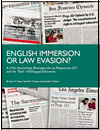Learning the Language

It was only yesterday that FlashReport published a commentary by Lance Izumi, the senior director of education studies for the Pacific Research Institute, that praises Proposition 227, the ballot measure approved by California voters 10 years ago this month that greatly curtailed bilingual education in California. And already, Stephen Krashen, a professor emeritus at the University of Southern California, Los Angeles, has posted an article on the ELL Advocates blog that he published in 2004 that he believes rebuts Mr. Izumi’s premise. (The posting has a time of 1:48 a.m., which would mean that Mr. Krashen posted it yesterday Pacific Standard Time.)
Mr. Izumi wrote: “Despite the guerrilla warfare of opponents, 227 has proven to be a step forward for [English-learner] students.” He cited the fact that a five-year study on the effects of Prop. 227 commissioned by the California Department of Education says that many educators interviewed concluded that the overall effect of the proposition on ELLs had been positive.
Mr. Krashen notes in his article that the same five-year study found that there was practically no difference in gains on test scores between schools that kept bilingual education after passage of Prop. 227 and those that dropped the method. (Though Mr. Krashen doesn’t say this in his article, the researchers for that study said that the evidence was inconclusive that one method for teaching ELLs was more effective than another.)
Mr. Krashen’s article, “Proposition 227 and Skyrocketing Test Scores: An Urban Legend from California,” published in the December 2004/January 2005 issue of Educational Leadership, aimed to poke holes in claims that Proposition 227 had improved test scores in California. Mr. Krashen wrote:
There is no question that test scores went up in California, but dropping bilingual education had nothing to do with the increase. Test score increases in California appear to be a result of the usual “test score inflation” that occurs when new tests are introduced. In California, inflation has been particularly strong because of intense pressure to raise scores.
You can be sure that if someone praises Proposition 227, the prolific Mr. Krashen stands ready to make public a counterargument based on research studies.
See an earlier post, “Ten-Year Anniversary of Proposition 227.”
Izumi Reflects on 10 Years of Prop. 227–And Krashen Rebuts
Mary Ann Zehr
Learning the Language
It was only yesterday that FlashReport published a commentary by Lance Izumi, the senior director of education studies for the Pacific Research Institute, that praises Proposition 227, the ballot measure approved by California voters 10 years ago this month that greatly curtailed bilingual education in California. And already, Stephen Krashen, a professor emeritus at the University of Southern California, Los Angeles, has posted an article on the ELL Advocates blog that he published in 2004 that he believes rebuts Mr. Izumi’s premise. (The posting has a time of 1:48 a.m., which would mean that Mr. Krashen posted it yesterday Pacific Standard Time.)
Mr. Izumi wrote: “Despite the guerrilla warfare of opponents, 227 has proven to be a step forward for [English-learner] students.” He cited the fact that a five-year study on the effects of Prop. 227 commissioned by the California Department of Education says that many educators interviewed concluded that the overall effect of the proposition on ELLs had been positive.
Mr. Krashen notes in his article that the same five-year study found that there was practically no difference in gains on test scores between schools that kept bilingual education after passage of Prop. 227 and those that dropped the method. (Though Mr. Krashen doesn’t say this in his article, the researchers for that study said that the evidence was inconclusive that one method for teaching ELLs was more effective than another.)
Mr. Krashen’s article, “Proposition 227 and Skyrocketing Test Scores: An Urban Legend from California,” published in the December 2004/January 2005 issue of Educational Leadership, aimed to poke holes in claims that Proposition 227 had improved test scores in California. Mr. Krashen wrote:
There is no question that test scores went up in California, but dropping bilingual education had nothing to do with the increase. Test score increases in California appear to be a result of the usual “test score inflation” that occurs when new tests are introduced. In California, inflation has been particularly strong because of intense pressure to raise scores.
You can be sure that if someone praises Proposition 227, the prolific Mr. Krashen stands ready to make public a counterargument based on research studies.
See an earlier post, “Ten-Year Anniversary of Proposition 227.”
Nothing contained in this blog is to be construed as necessarily reflecting the views of the Pacific Research Institute or as an attempt to thwart or aid the passage of any legislation.